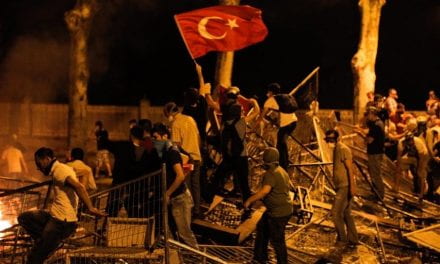By: Molly Cook*
“We have defeated ISIS.”[1] These are words that every American has been waiting to hear since the deadly attack on the United States on September 11, 2001. This attack was carried out by al-Qaida leader, Osama bin Laden; however, ISIS was built and conceived from the foundations of al-Qaida. President Donald Trump claimed that “we have won” and ISIS has been defeated so the US will now leave Syria. While ISIS and al-Qaida are physical groups, they consist of and rely on people who support their mission and foundational philosophies. Therefore, the ideas and goals of ISIS and al-Qaida can still exist even though a physical caliphate might not exist anymore. With that being said, can an “idea” really be completely defeated? Yes, a physical caliphate can be destroyed, but the ideas of the group are still lingering – what is not to say that ISIS reforms in another area or quietly rebuilds as the United States withdraws from Syria?
President Donald Trump is known to be unpredictable and unconventional, but many felt blindsided in his announcement ordering the withdrawal of the 2,000 US ground troops in Syria. Ignoring advice from his generals and advisers, he announced in December 2018, that ISIS had been defeated and he was bringing our troops home. He said their return would come within 30 days, but this has not been the case.
It became clear that many did not advise or support this decision when criticisms and resignations started to flow in. Republican Senator Marco Rubio called this move a “catastrophic mistake” and Republican Senator Lindsey Graham said, “it needs to be reconsidered.”[2] Next, Defense Secretary James Mattis quit, and America’s chief diplomat in the fight against ISIS, Brett McGurk, followed the movement soon after.[3] The overall reactions to this decision were negative and it can be agreed upon that it is premature to pull troops from Syria because ISIS has not been fully defeated, US allies will be negatively affected by this decision, and a power vacuum will be created.
The Syrian Civil War has been going on for eight years and has many moving parts. In March of 2011, the first shots were fired by Syrian dictator, Bashar al-Assad against the peaceful Arab Spring demonstrators.[4] In July, the protesters started to shoot back, and some Syrian troops defected from the Syrian army to join them, calling themselves the Free Syrian Army (FSA).[5] This uprising was the beginning of the civil war. In 2015, FSA joined the newly founded and US-supported Syrian Democratic Forces (SDF).[6] The conflict has been divided into four sides – Assad, ISIS, the Kurds, and the Rebels – with Assad (the Syrian government) backed by Russia and Iran, while anti-government rebel groups (FSA/SDF) are backed by the United States, Saudi Arabia, Turkey, and others in the region.[7] The United States claimed that their main focus was fighting ISIS by training rebel soldiers to fight against ISIS. The US supported the rebels until President Trump was elected. He vowed to stay out of Syria, thus signaling that Assad would be able to stay in power.[8] This attitude towards Assad changed when he used chemical weapons, killing 85 people. In response, the White House launched dozens of tomahawk missiles that struck an air base in Syria. This was the first time the United States directly attacked the Assad regime.[9] So, what happened between these missile strikes, acknowledging the obvious existence of ISIS, and the announcement that ISIS has been defeated?
In May 2017, President Trump agreed to supply arms to YPG Kurdish Popular Protection Units to support an operation with the goal to retake the Syrian city of Raqqa, Islamic State’s de facto capital in Syria and a hub for planning attacks against the west.[10] In June 2017, the US shot down a Syrian fighter jet near Raqqa after it allegedly dropped bombs near US-backed rebel Syrian Democratic Forces (SDF). Between October and November of 2017, the Lebanese militant group, Hezbollah, and the Syrian army launched a military operation to dislodge jihadist groups from the Arsal area; the Islamic State group was driven from Raqqa and Deir al-Zour.[11] In April 2018, there were claims of new chemical attacks in Eastern Ghouta’s main town of Douma. This prompted the US, Britain, and France to send a wave of retributive strikes and in July 2018, the Syrian army recaptures almost all of the south of the country, up to the borders with Jordan and Israeli-held territory. Finally, between September and December of 2018, Kurdish-led SDF forces launched an attack that reduced ISIS territory to a small enclave on the Iraqi border.[12]
Currently, there are about 2,000 US soldiers in Syria who are fighting alongside the Kurdish groups. If the United States leaves Syria, it would be harming its allies in the area and, as the SDF warned, it would “negatively impact” the anti-ISIS campaign and the group might “revive itself again.”[13] Moreover, the SDF released a statement that warned that this would have “dangerous implications” for regional stability and “create a political and military vacuum…leaving its people between the claws of hostile parties.”[14] Furthermore, the US has been able to maintain civility between Turkey and the Kurds, but Turkey, a bordering country of Syria, has warned that they are prepared to launch a military operation against the Kurdish YPG militia. According to NPR’s Ruth Sherlock, reporting from Beirut, “there’s a lot of panic among civilians. We reached people in Raqqa, that’s one of the main cities that were largely destroyed in this war against ISIS. And they say they just don’t know who will control this area now.”[15] Another fear is that ISIS will exploit the chaos and return to the area, similar to extremists returning after the US pulled out of Iraq after the war.[16]
In addition to the fear of what will happen geopolitically, there is proof that ISIS has not truly been defeated. Aside from the fact that extremists will always exist in any political atmosphere and they will never disappear, there was also a suicide bombing that was claimed by ISIS just a few weeks after President Trump’s declaration.[17] This bombing took place in the Syrian city of Manbij and killed four Americans – two U.S. servicemembers, one civilian Defense Department employee and one military contractor – and injured three other service members.[18] Additionally, to make such an explicit and sweeping claim is imprudent and, in this case, premature because there are significant numbers of ISIS affiliated militants in Afghanistan, Egypt, Libya, South-East Asia, West African and, to a lesser extent, Yemen, Somalia, Sinai, and the Sahel.[19] As noted before, ISIS has been known to take advantage of chaos. They grew out of al-Qaeda in Iraq and became a major force in the country’s insurgency. Then, in 2011, they joined the rebellion against President Bashar al-Assad in Syria where they found a hub that allowed easy access to weapons.[20] It should be noted that ISIS has shrunk significantly, as they once controlled 34,000 square miles of territory from western Syria to eastern Iraq, imposed brutal rule on eight million people, and generated billions of dollars in revenue from oil, extortion, robbery, and kidnapping. Now there are between 1,000 and 1,500 militants left in a 20 square mile area near Syria’s border with Iraq. This progress would not have been achieved without the US intervention alongside of the Kurds.[21] Now that the US is leaving, who is there to stop ISIS from reclaiming that territory?
Most recently, the US Department of State offered a $1 million reward for information leading to the location of Hamza bun Laden, the son of Osama bin Laden because of concern that Hamza “is emerging as a leader” of al-Qaida.[22] It has been suggested that Hamza is hiding around the border between Pakistan and Afghanistan.[23] He has been posting videos calling for attack on the US and western allies in hopes of exacting “revenge” against the US for killing his father.[24] With ISIS having evolved from al-Qaida, this might be a perfect opportunity for a reformation, relocation, and a new era of ISIS with revenge on the United States as the motive.
There is no simple rationale behind the timing and announcement of the intent to withdraw from Syria. There is some speculation that this announcement was a stunt to distract from President Trump’s legal troubles or that he was influenced by the phone call with the Turkish President. Some think that a big deal with Syria is in the works and the US sold out its Kurdish partners; however, speculations aside, President Trump has been talking about leaving Syria for a while. In March 2017, he casually announced that US forces will “be coming out of Syria, like, very soon” and in April, he gave the military six months to finish the job against ISIS. After SDF captured the town of Hajin, the last ISIS controlled urban area, Trump believed that it was time to bring the troops home and this is why he felt it was time for his surprise announcement. The United States should leave Syria eventually, but it is too soon to leave, and it is premature to say that ISIS is fully defeated.
[1] Trump, Donald . Twitter post. December 19, 2018, 6:29 a.m. https://twitter.com/realdonaldtrump/status/1075397797929775105?lang=en
[2] The New York Times. “A Timeline of U.S. Military Involvement in Syria | NYT News.” YouTube. January 09, 2019. https://www.youtube.com/watch?v=RrH40nCcjwE.
[3] “US Envoy Brett McGurk Quits over Trump Syria Pullout.” BBC News. December 23, 2018. https://www.bbc.com/news/world-us-canada-46661384.
[4] Slackman, Michael. “Syrian Troops Open Fire on Protesters in Several Cities.” The New York Times. March 25, 2011. https://www.nytimes.com/2011/03/26/world/middleeast/26syria.html.
[5] Ibid.
[6] Burke, Jason. “Rise and Fall of Isis: Its Dream of a Caliphate Is Over, so What Now?” The Guardian. October 21, 2017. https://www.theguardian.com/world/2017/oct/21/isis-caliphate-islamic-state-raqqa-iraq-islamist.
[7] “Global Conflict Tracker L Council on Foreign Relations.” Council on Foreign Relations. https://www.cfr.org/interactives/global-conflict-tracker?marker=26#!/conflict/civil-war-in-syria.
[8] “ISIS Fast Facts.” CNN. January 21, 2019. https://www.cnn.com/2014/08/08/world/isis-fast-facts/index.html.
[9] “Global Conflict Tracker L Council on Foreign Relations.” Council on Foreign Relations. https://www.cfr.org/interactives/global-conflict-tracker?marker=26#!/conflict/civil-war-in-syria.
[10] “Syria Profile – Timeline.” BBC News. January 14, 2019. https://www.bbc.com/news/world-middle-east14703995.
[11] Ibid.
[12] Ibid.
[13] Chappell, Bill, and Colin Dwyer. “How Is The World Reacting To Trump’s Decision To Withdraw From Syria?” NPR. December 21, 2018. https://www.npr.org/2018/12/20/678642985/how-is-the-world-reacting-to-trumps-decision-to-withdraw-from-syria.
[14] “Syria’s Kurds Say Trump US Troop Pullout Harms Anti-IS Fight.” BBC News. December 20, 2018. https://www.bbc.com/news/world-middle-east-46632657.
[15] Chappell, Bill, and Colin Dwyer. “How Is The World Reacting To Trump’s Decision To Withdraw From Syria?” NPR. December 21, 2018. https://www.npr.org/2018/12/20/678642985/how-is-the-world-reacting-to-trumps-decision-to-withdraw-from-syria.
[16] Ibid.
[17] Hennigan, W.J. “Syria Blast Shows the Battle Against ISIS Is Far From Over.” Time. January 16, 2019. http://time.com/5504546/syrian-explosion-isis-fight/.
[18] “Explosion Kills Four in Manbij.” U.S. Central Command. http://www.centcom.mil/MEDIA/PRESS-RELEASES/Press-Release-View/Article/1733559/explosion-kills-four-in-manbij/.
[19] “After the Caliphate: Has IS Been Defeated?” BBC News. February 07, 2019. https://www.bbc.com/news/world-middle-east-45547595.
[20] “After the Caliphate: Has IS Been Defeated?” BBC News. February 07, 2019. https://www.bbc.com/news/world-middle-east-45547595.
[21] Ibid.
[22] Schwartz, Matthew S. “U.S. Offers $1 Million For Info Leading To Son Of Bin Laden.” NPR. March 01, 2019. https://www.npr.org/2019/03/01/699264405/u-s-offers-1-million-for-info-leading-to-son-of-bin-laden.
[23] Ibid.
[24] Ibid.
*Disclaimer: The content contained in the following material is the sole ownership of the author and does not reflect the Towson University Journal of International Affairs nor Towson University in any respect whatsoever.






